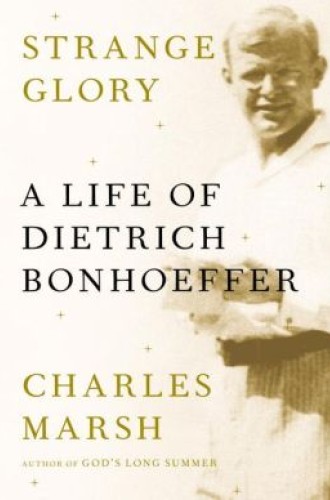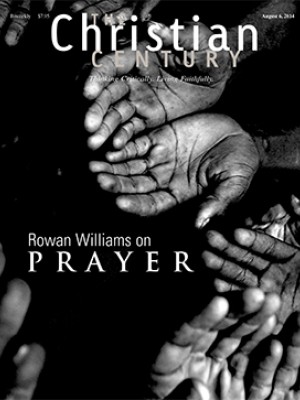Bonhoeffer’s loves
Charles Marsh has written a moving, melancholy portrait of Dietrich Bonhoeffer, the German theologian and pastor executed in a concentration camp two months before World War II ended in Europe.
With both empathy and a critical eye, Marsh traces Bonhoeffer’s mercurial existence. He was a brilliant theologian who never found a regular university appointment. He was in love with a man who returned his ardor only in part. He was always restless, geographically, ecclesiastically, and theologically. He was an exuberant traveler who found beauty and meaning in both Catholic Rome and black Harlem. He rejected the regnant liberalism of early 20th-century German Protestantism, found both inspiration and a sparring partner in Karl Barth, and eventually looked to a “religionless” Christianity beyond the church.
Bonhoeffer spent most of his formative years in Berlin and in a country home in the Harz Mountains in central Germany. The son of a teacher and a professor of neurology and psychology, he lived for many years a privileged, even spoiled existence. Bonhoeffer was the ideal companion for a visit to an art gallery, an evening at the opera, a night of fine dining and drink, or a vacation almost anywhere. His aristocratic vanities sometimes drove others to distraction.
Read our latest issue or browse back issues.
When Bonhoeffer accepted a brief assistant vicar post in Barcelona, his superior expected him to arrive by Christmas, but he dawdled for two months in Berlin. When he finally got under way, he stopped for a week’s vacation in Paris. In his letters to Barcelona, he expressed far more concern about what clothes he should bring than about how he should prepare for his parish responsibilities. Bonhoeffer was a dandy, and he did make an impression with his fashionable attire. He regularly wrote to ask his mother to procure a pair of trousers or shoes. Even in his thirties he sometimes mailed soiled clothes home to be laundered. Marsh observes quite fairly that Bonhoeffer’s emotional maturity never matched his intellectual prowess and dedication to spiritual formation.
From the pulpit, however, Bonhoeffer impressed congregants with his earnestness and clarity, and he proved particularly successful in his work with children and youth. During his years of study in Berlin, he gradually rejected the “scientific theology” of his mentors, instead embracing Barth’s neoorthodox distinction between human religion and God’s revelation: human beings should not search for a God in reason or in human culture—or, Bonhoeffer would soon conclude, through their nation and its leaders.
But, Marsh notes, Bonhoeffer also tempered Barth’s “wholly other” God by insisting that human beings encountered a God who was immanent in Christian community. At first Bonhoeffer presumed that that community was the church. Later he found it in monastic life, in the small community of dissident pastors he mentored, and among the conspirators—many of whom were skeptics or atheists—who sought to topple the Nazi regime.
When he did not find a clear path forward in Berlin, Bonhoeffer spent nine months at Union Theological Seminary in New York. “There is no theology here,” Bonhoeffer quickly concluded, with a condescension shared by many of his German peers. He was intrigued by Reinhold Niebuhr’s Christian realism but felt that Niebuhr’s ethics were too detached from anything transcendent or confessional. “In New York,” Bonhoeffer complained, “they preach about virtually everything except . . . the gospel of Jesus Christ.” At Harlem’s Abyssinian Baptist Church, by contrast, he found what he considered “real religion,” an authentic combination of Christian discipleship and ethics.
By the time Bonhoeffer returned to Berlin, the Weimar Republic was crumbling. His greatest moments of clarity and leadership came in the five years after Hitler’s ascent to power in 1933. While the German Christian movement eagerly and successfully took steps to Nazify the church, Bonhoeffer responded with an emphatic “Nein.”
When in July 1933 the new Reich Church approved the Aryan paragraph, which ordered the removal of all Jews, including Jewish converts, from service in the church, Bonhoeffer circulated a rejoinder stating that anyone who refused to worship with Christians of Jewish descent was essentially “leaving the church.” In the Kirchenkampf that followed, Bonhoeffer sought to persuade ecumenical organizations to recognize within Germany only the Confessing Church, the communion of parishes and pastors that resisted Nazification. Most Confessing Church leaders sought to defend the church’s autonomy from the state, but Bonhoeffer offered a much more thorough critique of Nazi idolatry and evil.
When Bonhoeffer assumed leadership of a Confessing Church preaching seminary in Finkenwalde, he introduced monastic practices designed to nurture the faith necessary for fidelity to the gospel in the face of state oppression. Some students found his requirements, such as times of silence, absurd. A few even mocked him as the community’s führer. Other students, however, found the community delightful and nourishing.
Meanwhile, nearly the entire theology faculty in Berlin accepted the new political reality; several became enthusiastic Nazis. Perhaps because of that travesty, Marsh makes theological liberalism—at least the German variety of the early 20th century—a bogeyman. Marsh calls the German Christian movement “perhaps a predictable denouement for a tradition [spanning from Kant to Adolf von Harnack] that increasingly turned theology into anthropology.” Like Bonhoeffer, Marsh is sympathetic to Barth’s view that Germany’s liberal theologians surrendered the faith “to the patterns, forces, and movements of human history and civilization.”
The point is not unreasonable, but the German Christians did far more than carry on “the work of their Protestant liberal forebears.” Moreover, Christians from a wide range of theological starting points have both sanctioned and turned a blind eye to evil.
That quibble aside, Strange Glory is a biographical triumph. Bonhoeffer was prolific but not given to introspection, so he is psychologically elusive. Through generous quotations from sermons, books, and especially letters, Marsh brings readers closer to Bonhoeffer than any prior biographer writing in English. Moreover, he far more fully explores one critical aspect of his subject’s life than did the theologian’s most famous biographer, Eberhard Bethge. For Bethge was himself, Marsh says, the subject of Bonhoeffer’s love, a love that “strained toward the achievement of a romantic love, one ever chaste but complete in its complex aspirations.”
After meeting at Finkenwalde, Bonhoeffer and Bethge lived together for some time, shared a bank account, and sent joint Christmas gifts to family members and friends. But their relationship was unbalanced. Bonhoeffer consistently demanded more from Bethge than the latter gave: more attention, more letters, and more visits. Eventually, Bethge became engaged to a much younger woman, Bonhoeffer’s niece, and distanced himself from the friendship. Bonhoeffer promptly imitated his friend. Although he bacame engaged to the 17-year-old Maria von Wedemeyer, his heart remained Bethge’s until the end.
Bonhoeffer’s connection to the conspiracy to assassinate Hitler has added greatly to his posthumous reputation, though Marsh justly observes that Bonhoeffer’s “duties as a conspirator were actually few.” In 1941 Bonhoeffer became a double agent of sorts, officially working for military intelligence while attempting to use his ecumenical contacts for the benefit of the German resistance. Heroically he helped arrange visas that enabled 14 Jews to escape to Switzerland. In March 1943, he was arrested.
On an April morning in 1945, Bonhoeffer was told to undress and was led to a gallows. He and five other prisoners were hanged like “animals in a slaughterhouse,” with their feet barely touching the ground so they would die a slow and excruciating death.
Despite American Christians’ many attempts to claim him, Bonhoeffer cannot easily serve as a role model. Few of us encounter an existential threat similar to what he faced. Nor can we simply ape his spiritual disciplines or ideas. Most of us could not afford his fashion taste. Many of us, however, inhabit the same world of restless uncertainty and are desperate to know how the church can provide a clear witness amid idolatry and injustice.
Faced with such vexing problems, Bonhoeffer often tacked back to basic questions. “Who is this Jesus Christ, the one who encounters us in the Word of God?” Are we “willing to offer our lives to the church and the world”? Bonhoeffer was willing, and he did. Marsh does not provide us with a modern saint. Instead, he depicts a talented and tortured theologian and pastor who might inspire us to look beyond traditional or simplistic answers to those most important questions.







